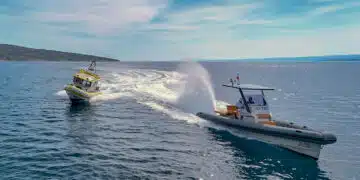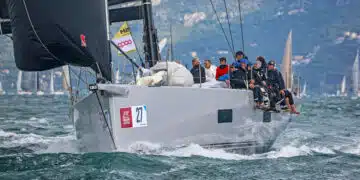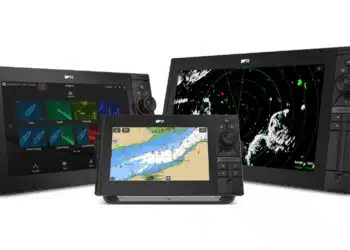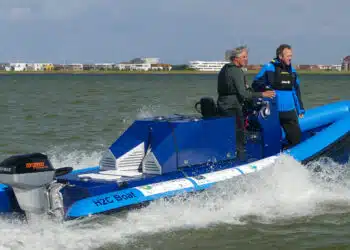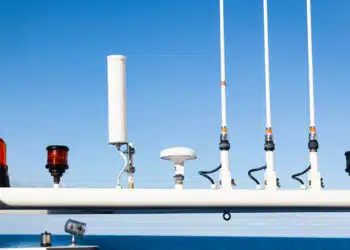eD-Tec (Electric Driven Technology) is the name of a young start-up that develops electric drives for motorboats. A year ago, the company tested the first boat equipped with such a system. Now the Munich-based inventors are launching their second product: a new 9.5 metre-long high-performance rigid inflatable boat called the eD 32 c-ultra, which will be available with cruising and performance batteries. SeaHelp secured the first test runs in Croatia on the island of Krk in front of Marina Punat.</strong
Michael Jost is convinced that the future on the water is electric. The now 62-year-old was one of the protagonists of the electric strategy under the then Volkswagen boss Herbert Diess until 2021. Jost is certain that the changes in terms of drive systems will take place just as consistently on the water as they currently do on the road; when, he says, is only a question of time.
For this reason, the former VW strategist switched to self-employment and quickly founded his own family business called eD-Tec. Jost’s aim is to develop platforms and modules between 50 and 2,400 kW for electric drives, just as he did at VW – but this time for yachts between six and 30 metres long.
In addition to the environmental aspect, this should help to reduce costs and ensure easy installation – even on used yachts whose drives are to be converted to electric.
The latest product from the Munich-based start-up “eD-Tec” is an all-electric high-performance RIB “eD 32 c-ultra”
Jost and his Munich-based start-up have now unveiled their second all-electric high-performance boat, a 9.5 metre-long RIB. A RIB (which stands for Rigid Inflatable Boat) is an inflatable boat with a rigid hull. It has better buoyancy properties than conventional inflatable boats, is lightweight, can be powerfully motorised and is also suitable for offshore applications.
In recent years, there have been numerous innovations in the design of RIB hulls, which have increased speeds and further improved sailing stability. The high-performance inflatable boats from various manufacturers currently reach speeds of up to 100 km/h or more.
The ed-Tec RIB was fitted with a carbon hull, which helped to further reduce the weight of the already lightweight inflatable boat. It is powered by the fully electric drive system from eD-TEC developed by Jost itself; according to ed-Tec, the development time was just nine months.
The basis for the new rigid-hull inflatable boat was a design by Sven Akermann from Hergensweiler
The new model, named eD 32 c-ultra, is based on a tried-and-tested Akermann design that has been modified in the aft section to enable the installation of the eD-QDrive 1 drive units along with control elements and batteries from eD-TEC.
“With an overall length of 9.5 metres, a maximum width of 3.2 metres and a draught of 0.84 metres, the new rigid-hull inflatable boat offers the perfect platform for exploring lakes and coasts alike,” promises Michael Jost. A cruise speed of 30 knots (55 km/h) and a high speed of up to 50 knots (92 km/h) should ensure “exciting journeys without emissions and noise”.
At the same time, an optional jet thruster system should ensure that the boat is “super manoeuvrable” in the tightest of spaces, making it “perfect for guest use on superyachts”.
“We had our first contact with Sven Akermann about a year ago because he was interested in the work of eD-Tec and supported us,” says Michael Jost. There are not many boat builders who can build in full carbon fibre, and in a very short development time.

The quality of the construction is “unrivalled”. In addition, the hull is prepared for foiling; customers can optionally choose a foil support system, which should offer more range and also be able to further support seaworthiness.
Thanks to the absence of the usual outboard engines, there is a large bathing platform that offers easy access to the water
Thanks to the compact design of the propulsion system and the fact that there are no conventional outboard engines, the design offers more space in the stern for leisure aspects such as the large, dedicated sun deck and – thanks to a large bathing platform – easy access to the water.
The construction number 1 is aimed specifically at the superyacht and leisure market, says Jost, but there are already requests for special versions of the eD 32 c-ultra for water police and other applications.
The new eD-Tec-RIB has a central control console with two seats and a fully glazed instrument panel that includes a 15.6-inch Axiom MFD for navigation and a second screen for system monitoring, as well as a wired MOB system and steering and throttle controls.
The standard version includes a storage compartment in the bow area and a large bathing platform with integrated bathing ladder aft behind the sunpad. A hardtop above the helm station is designed to provide shade and protection from the elements.
Extensive options are also available, including alternative colours, a modular sunpad with two additional forward-facing seats, a table and a 36-litre refrigerator, Ullmann seats, radar, sonar and autopilot. Solar panels on the hardtop are also available.
The RIB is said to have a range of up to 30 nautical miles / 55 kilometres on a single charge
The hull is equipped with 100 kWh batteries in eD-TEC’s slim battery pack design, which should enable a range of up to 30 nautical miles / 55 kilometres on a single charge. These are connected via the Technology Stack and AI BOX to the self-contained eD-QDrive 1 propulsion units, which contain the motors, gearboxes and surface-piercing propellers.
The sealed drive units not only house all components (and should therefore be completely maintenance-free), they should also be able to offer plug-and-play convenience. In addition, the AI system should be able to offer over-the-air (OTA) updates, “which means that the drives can be continuously improved while the technical backbone of eD-Tec is further refined and developed”, says Michael Jost.
According to the manufacturer, the eD-QDrive units supply the propellers with a peak power of up to 400 kW, which in combination with the silent operation should ensure a “breathtaking boating experience”. The c-ultra-RIB has a standard 22 kW AC charge as well as a 150 kW DC fast charge, which is said to be able to charge the batteries to 80 per cent in just 40 minutes.
SeaHelp secured the test drives with professional expertise and its powerful and fast rescue boats
SeaHelp, Europe’s largest breakdown and recovery service for recreational boating to provide assistance in non-life-threatening situations, which is also consistently committed to sustainability, is supporting eD-TEC’s sea trials by providing fast and powerful rescue boats for escorting and securing.
“With its highly integrated, holistic drive system, ED-TEC is a pioneer in the field of nautical e-mobility, and we are delighted to be able to support the testing of the new all-electric RIB,” says Sea Help Managing Director Wolfgang Dauser. Test runs of up to 50 knots (92 km/h) and beyond would require professional planning and support, which SeaHelp specialises in.

Further information:
Zeppelinstraße 71-73
81669 Munich | Germany
Tel: +49 (0) 89 360 368 20
Email: future@ed-tec.de
Web: www.ed-tec.de
Sven Akermann shipyard
Rupolzer Street 64
88138 Hergensweiler | Germany
Tel: +49 (0) 172 434 38 38 38
Email: info@sawerft.de
Web: www.svenakermannwerft.com







